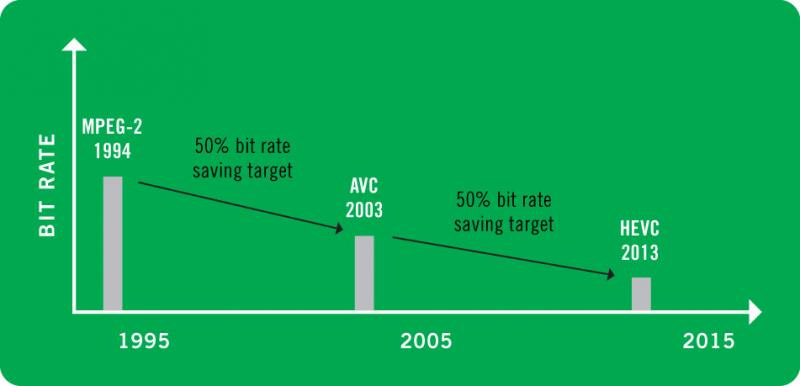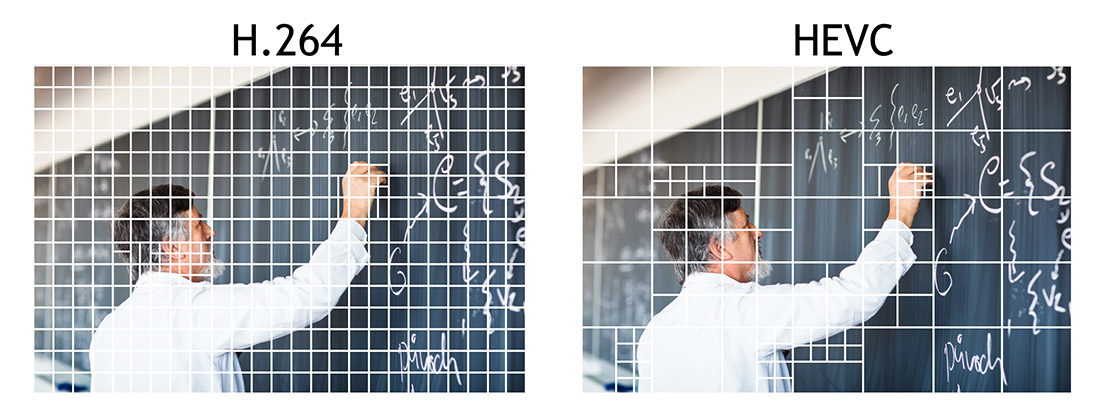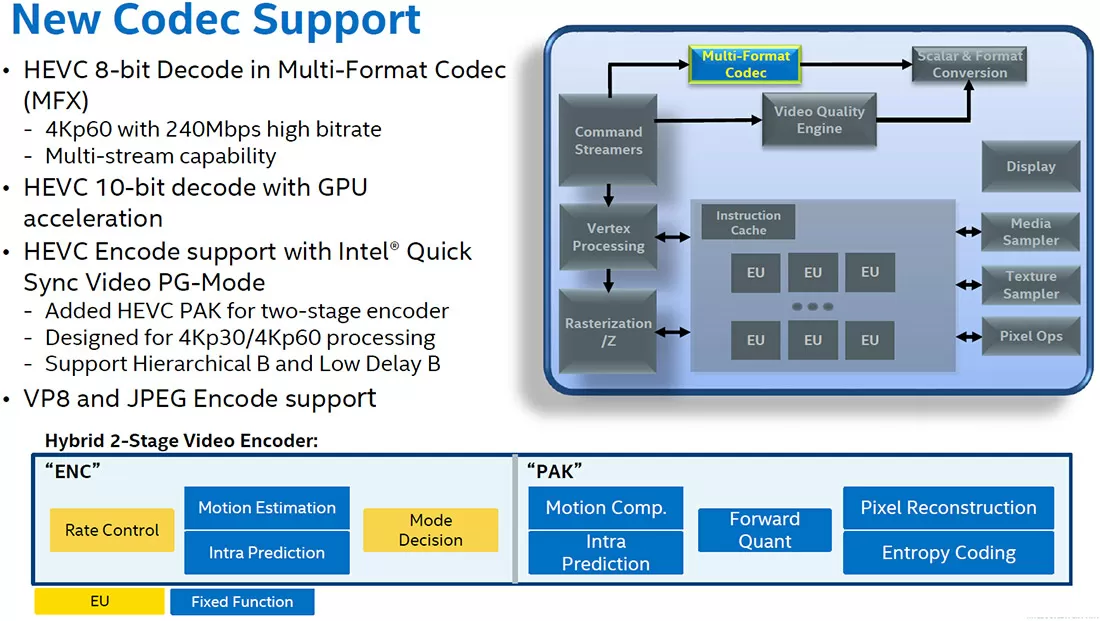For years,?? ??? ?? H.264 has been the go-to video compression standard. Whenever you download a film or TV show, watch a Blu-ray, view HDTV broadcasts, or stream something from various sites and services, there's a very good chance the video stream you're watching has been encoded with H.264.
H.264 is a great compression standard for a number of reasons. It provides very good quality at relatively low bitrates, and its widespread use means it's supported by essentially every video playback device made in the past five to ten years. It's also very versatile, not only allowing compression to small file sizes, but also to high quality, high bitrate files that are suitable for use on Blu-ray discs.
While H.264 is doing a pretty good job of delivering compressed videos to users, there's a better standard out there that offers similar quality at even smaller file sizes. The standard is called HEVC, or High Efficiency Video Codec, and it first appeared in 2013 as a true successor to H.264. For this reason, HEVC is also known as H.265, or MPEG-H Part 2.

HEVC's main advantage over H.264 is that it offers roughly double the compression ratio for the same quality. This means that a video file encoded with HEVC can occupy half the space of its H.264 equivalent with no noticeable change in quality, or the same amount of space with improved quality. Sounds pretty good, right?
HEVC is able to compress files to a greater extent than before by evolving upon the H.264 standard. In both of these standards, motion compensated prediction is used to find areas that are redundant within a single frame or in the frames that follow. When redundant blocks of pixels are identified, they are encoded by referencing another area in the same or following frames. In H.264, these blocks can be up to 16x16 pixels in size, but big gains in compression were made by increasing this to 64x64 in HEVC.
Other improvements also help HEVC achieve greater levels of compression, including better variable-block-size segmentation, improved deblocking and motion compensation filters, sample adaptive offset filtering, and better motion vector prediction and precision. This page here from the x265 group has a great explanation of these terms and how it can improve HEVC's efficiency.

As HEVC is relatively new to the scene, it's not nearly as compatible with existing playback devices as H.264. Many such devices have dedicated hardware for decoding H.264 streams, while equivalent hardware for decoding HEVC is significantly less common. That's not to say it's impossible to decode HEVC on today's devices - software playback is still possible on a wide variety of hardware, and some hardware decoding solutions exist - but something that can play H.264 is not necessarily HEVC-compatible.
Note:This feature was originally published on 02/16/2016. We have briefly revised it and bumped it because it's as relevant today as it was before (if not more, considering today's broader 4K support). Part of our #ThrowbackThursday initiative.
Here's a quick rundown of well-known hardware that includes dedicated HEVC decoding blocks, which definitely support efficient HEVC playback:
As you can see, most desktop hardware released in 2015, and most mobile hardware from late 2014 onwards, supports dedicated HEVC playback. Hardware designers have been more focused on getting HEVC decoding blocks into mobile hardware first, as the CPUs in these products typically aren't fast enough for software decoding. Support in desktop hardware has been marginally slower as most desktop-class parts are powerful enough to decode HEVC without dedicated decoding blocks.

If you have a computer or device that doesn't include the aforementioned hardware, that doesn't mean you won't be able to decode HEVC. PCs, even those with entry-level CPUs from several years ago, shouldn't have much trouble software decoding HEVC videos. One of my HTPCs equipped with a $50 Intel Celeron 'Ivy Bridge' CPU from 2012 is more than capable of decoding HEVC, and I've even achieved smooth playback on Intel Bay Trail and Qualcomm Snapdragon 801 devices in some circumstances (albeit at high CPU utilization).
As a general rule of thumb, if you have an older PC you'd describe as "very slow" it probably won't be capable of HEVC playback. Anything else will probably suffice.
Where you won't find HEVC playback support is in many dedicated media players on the market today. These products either don't support HEVC hardware decoding, have too low power SoCs to support smooth software playback, or only support a small handful of popular video formats without the ability to run wide format playback software like VLC.

Here's a quick rundown of popular media playing devices that don'tsupport HEVC:
And here are the media players that do support HEVC:
This isn't an exhaustive list, but you can clearly see that there's just a handful of very recent devices that support native HEVC playback. The Xbox One is the only console to support playback, although support for HEVC was added through a software update, presumably utilizing software decoding.
So while the benefits of HEVC encoding are clear, playback is essentially restricted to PCs, high-end smartphones and tablets, and a very small range of media players and consoles. At this point in time, compatibility is a disadvantage to encoding your media library in HEVC.

As for software that can playback HEVC-encoded files, there are many options out there. On Windows 10, you can natively play HEVC videos in the default Films & TV app or through Windows Media Player. Alternatively, you can use VLC or MPC-HC for playback, which support older operating systems, or popular media center apps like Kodi (version 14 onwards) and Plex Media Player.
If you're running macOS or iOS, VLC is your best bet. On Android devices, you'll be able to play back HEVC files using MX Player through software decoding if your device is fast enough, or if it is, both MX Player and the Plex app supports native HEVC playback. Note that some devices have HEVC decoding blocks in their SoCs but don't support native playback at this time.
 Iconic Little Tokyo Mural Defaced with Graffiti
Iconic Little Tokyo Mural Defaced with Graffiti
 Spruce up your Zoom video calls with these helpful add
Spruce up your Zoom video calls with these helpful add
 Google's Plus Codes give every location in the world a digital address
Google's Plus Codes give every location in the world a digital address
 'The Fresh Prince of Bel
'The Fresh Prince of Bel
 OBITUARY: Susan Watanabe, Writer and Political/Community Activist Leader
OBITUARY: Susan Watanabe, Writer and Political/Community Activist Leader
 Julia Louis
Julia Louis
 Critics cringe as Showtime's 'The Comey Rule' hits close to home
Critics cringe as Showtime's 'The Comey Rule' hits close to home
 The most effective ways to support a loved one who believes in QAnon
The most effective ways to support a loved one who believes in QAnon
 JANM Statement on Letter Published in L.A. Times
JANM Statement on Letter Published in L.A. Times
 Bird's Air e
Bird's Air e
 JACL Calls for Better Hate Crime Tracking and Response
JACL Calls for Better Hate Crime Tracking and Response
 The new NHS COVID
The new NHS COVID
 Netflix's 'Get Organized' has viewers flocking to The Container Store
Netflix's 'Get Organized' has viewers flocking to The Container Store
 Spruce up your Zoom video calls with these helpful add
Spruce up your Zoom video calls with these helpful add
 Karen Umemoto Appointed Director of UCLA Asian American Studies Center
Karen Umemoto Appointed Director of UCLA Asian American Studies Center
 Amazon's Ring Always Home Cam is a flying drone for your home
Amazon's Ring Always Home Cam is a flying drone for your home
 Citymapper might be better than Google Maps. It just came to 17 more cities.
Citymapper might be better than Google Maps. It just came to 17 more cities.
 Everything coming to HBO Max in October 2020
Everything coming to HBO Max in October 2020
 Little Tokyo Community Forum on WSAB
Little Tokyo Community Forum on WSAB
 'Bake Off' brought us the biggest laugh of 2020 and we really, really needed that
'Bake Off' brought us the biggest laugh of 2020 and we really, really needed that
Men are ruining the 'She's a 10' memeThe 10 best and funniest tweets of the week, including iPods and Nick LacheyTikTok's air fryer tortilla pizza hack is perfect drunk foodTikTok's air fryer tortilla pizza hack is perfect drunk food'The Book Of NonTikTok's air fryer tortilla pizza hack is perfect drunk foodA guide to teaching children how to pet dogsKhaby Lame is now the mostWhere to buy sex toys online: 17 places to help you get offTechnoblade, 'Minecraft' YouTube creator, dies aged 23, family and fans pay tribute 'Jagged Little Pill' on Broadway has a lot to say: Review Leaked UK documents may have Russian link, Reddit says Facebook thinks hiding Instagram likes will get people to post more Amazon will build a new office in NYC after all The 10 best Netflix original series of 2019 Sydney, engulfed in smoke, has a ghastly air quality problem 'The Mandalorian' Chapter 5 explores familiar territory on Tatooine This simple observation about Baby Yoda's first word is going gloriously viral Elon Musk wins in 'pedo guy' trial These 2019 entertainment moments were so good we said NOPE!
0.1422s , 9881.140625 kb
Copyright © 2025 Powered by 【?? ??? ??】Enter to watch online.Guide to HEVC/H.265 Encoding and Playback,Global Perspective Monitoring